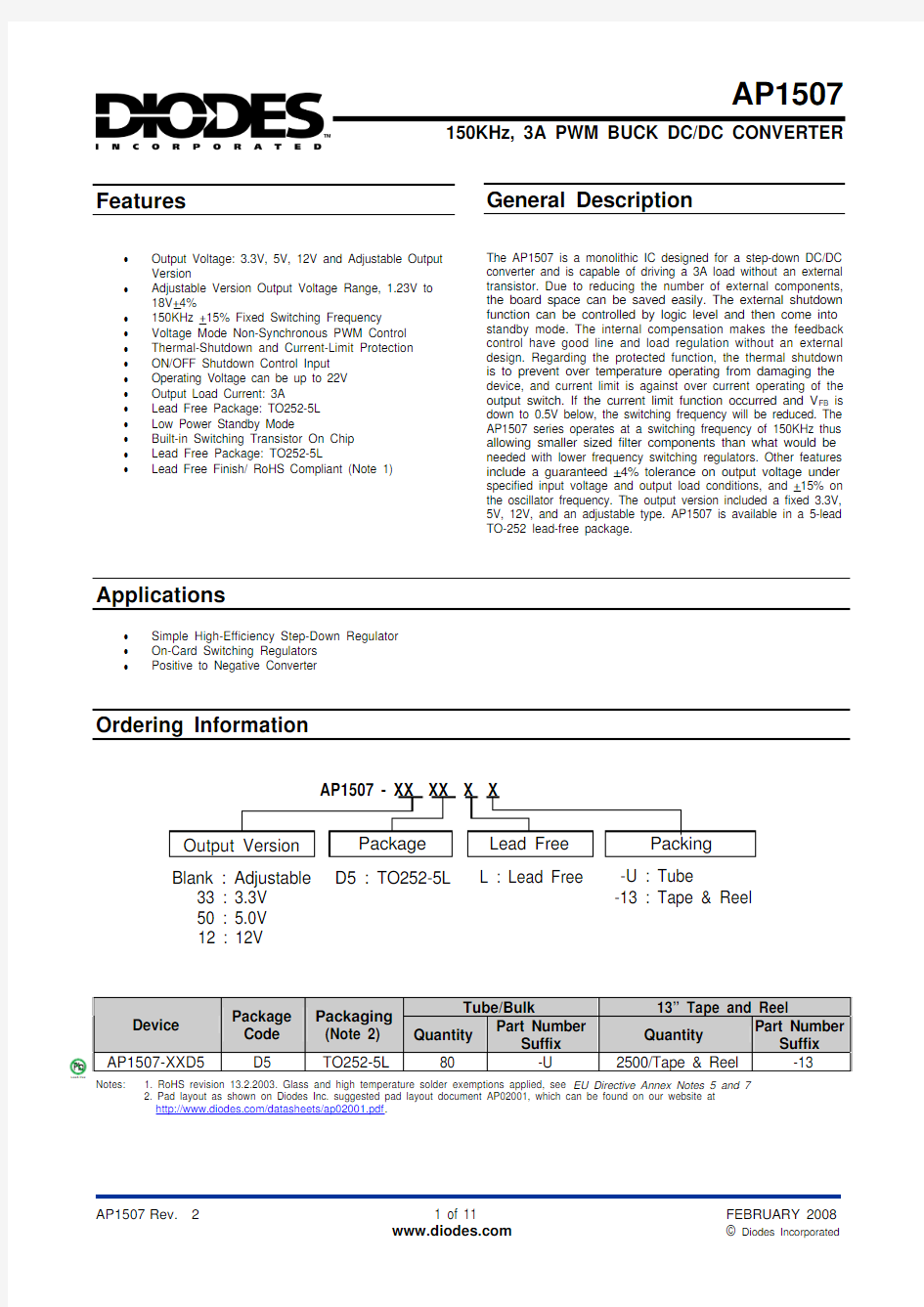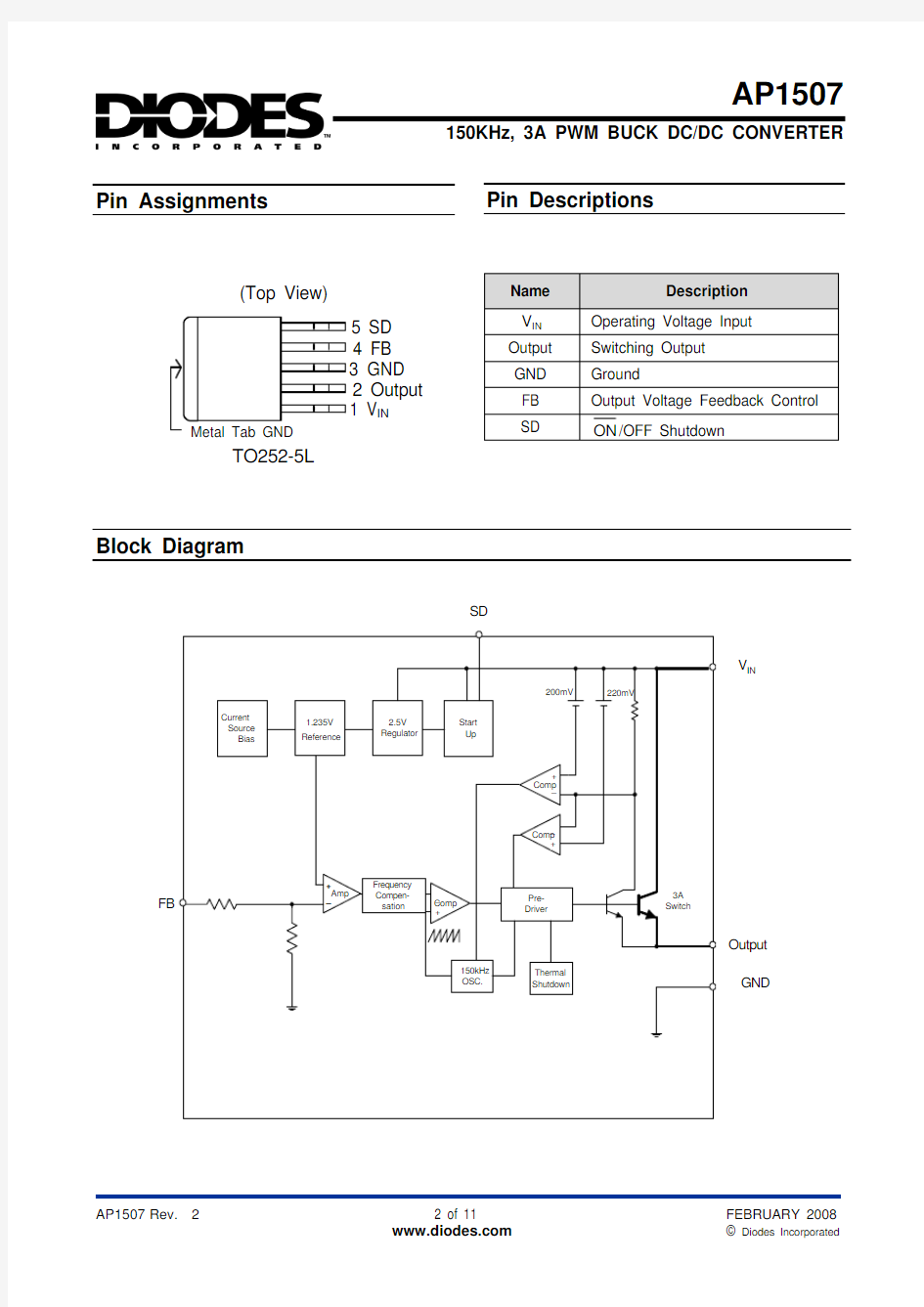AP1507


Lead-free
Features
General Description
The AP1507 is a monolithic IC designed for a step-down DC/DC converter and is capable of driving a 3A load without an external transistor. Due to reducing the number of external components, the board space can be saved easily. The external shutdown function can be controlled by logic level and then come into standby mode. The internal compensation makes the feedback control have good line and load regulation without an external design. Regarding the protected function, the thermal shutdown is to prevent over temperature operating from damaging the device, and current limit is against over current operating of the output switch. If the current limit function occurred and V FB is down to 0.5V below, the switching frequency will be reduced. The AP1507 series operates at a switching frequency of 150KHz thus allowing smaller sized filter components than what would be needed with lower frequency switching regulators. Other features include a guaranteed +4% tolerance on output voltage under specified input voltage and output load conditions, and +15% on the oscillator frequency. The output version included a fixed 3.3V, 5V, 12V, and an adjustable type. AP1507 is available in a 5-lead TO-252 lead-free package.
? Output Voltage: 3.3V, 5V, 12V and Adjustable Output Version
? Adjustable Version Output Voltage Range, 1.23V to 18V+4%
? 150KHz +15% Fixed Switching Frequency ? Voltage Mode Non-Synchronous PWM Control ? Thermal-Shutdown and Current-Limit Protection ? ON/OFF Shutdown Control Input ? Operating Voltage can be up to 22V ? Output Load Current: 3A
? Lead Free Package: TO252-5L ? Low Power Standby Mode
? Built-in Switching Transistor On Chip ? Lead Free Package: TO252-5L
?
Lead Free Finish/ RoHS Compliant (Note 1)
Applications
? Simple High-Efficiency Step-Down Regulator ? On-Card Switching Regulators ?
Positive to Negative Converter
Ordering Information
D5 : TO252-5L
-U : Tube
-13 : Tape & Reel
Blank : Adjustable
33 : 3.3V 50 : 5.0V 12 : 12V
L : Lead Free
Tube/Bulk
13” Tape and Reel
Device Package Code Packaging (Note 2) Quantity
Part Number
Suffix
Quantity
Part Number
Suffix
AP1507-XXD5
D5
TO252-5L
80 -U 2500/Tape & Reel -13
Notes: 1. RoHS revision 13.2.2003. Glass and high temperature solder exemptions applied, see EU Directive Annex Notes 5 and 7.
2. Pad layout as shown on Diodes Inc. suggested pad layout document AP02001, which can be found on our website at
https://www.360docs.net/doc/e14714882.html,/datasheets/ap02001.pdf .
(Top View)
TO252-5L
5 SD 4 FB 2 Output IN
Block Diagram
GND
Output V IN
SD
FB
Pin Assignments
Pin Descriptions
Absolute Maximum Ratings
Symbol Parameter Rating Unit
ESD HBM Human Body Model ESD Protection 2 KV
ESD MM Machine Model ESD Protection 200 V V CC Supply
Voltage +24 V V SD ON/OFF Pin Input Voltage -0.3 to +18 V
V FB Feedback Pin Voltage -0.3 to +18 V
V OUT Output Voltage to Ground -1 V
P D Power Dissipation Internally Limited W
T ST Storage Temperature -65 to +150 o C
T J Operating Junction Temperature -40 to +125 o C Recommended Operating Conditions
Symbol Parameter Min Max Unit
I OUT Output
Current 0 3 A
Voltage 4.5 22 V V OP Operating
T A Operating Ambient Temperature -20 85 o C
Electrical Characteristics (All Output Voltage Versions)
Unless otherwise specified, V IN = 12V for 3.3V, 5V, adjustable version and V IN = 18V for the 12V version. I LO = 0.5A AD Specifications with boldface type are for full operating temperature range, the other type are for T J = 25oC.
Symbol Parameter
Conditions
Min.
Typ.
Max. Unit -50
I FB
Feedback Bias Current
V FB = 1.3V
( Adjustable Version Only ) -10 -100
nA
127 150 173
F OSC Oscillator Frequency
110 173
KHz
F SCP
Oscillator Frequency of
Short Circuit Protect
When current limit Occurred and V FB < 0.5V, T a = 25 o C 10 30 50 KHz 1.6 V SAT Saturation Voltage I OUT = 3A
No Outside Circuit
V FB = 0V Force Driver On
1.4
1.7 V Max. Duty Cycle (ON) V FB = 0V Force Driver On
100 DC
Min. Duty Cycle (OFF) V FB = 12V Force Driver Off
% 5.5
I CL Current Limit Peak Current
No Outside Circuit
V FB = 0V Force Driver On
3.6
4.5
6.5 A
Output = 0V
No Outside Circuit
V FB =12V Force Driver Off
-200 uA I LEAK Output = -1V
Output leakage current V IN = 22V -5
mA I Q Quiescent Current V FB = 12V Force Driver Off
5
10 mA 150
I STBY
Standby Quiescent Current ON/OFF Pin = 5V
V IN = 22V 70
200
uA V IL Low (Regulator ON) - 0.6
V IH ON/OFF Pin Logic Input Threshold Voltage High (Regulator OFF) 2.0 1.3
- V I H ON/OFF Pin Logic Input Current V LOGIC = 2.5V (OFF)
-0.01 I L ON/OFF Pin Input Current V LOGIC = 0.5V (ON)
-0.1
-1
uA
θJA Thermal Resistance TO252-5L
Junction to
Case
10 o
C/W
θJC Thermal Resistance
with copper area of approximately 2cm ×2cm TO252-5L
Junction to
Ambient
50 o C/W
Electrical Characteristics (Continued)
Typical Performance Characteristics
AP1507 Efficiency vs. Temperature
(V in = 12V, V out = 5V, I o = 3A)
AP1507 Efficiency vs. Temperature (V in = 12V, V out = 3.3V, I o = 3A)
AP1507 Saturation Voltage vs. Temperature (V cc
= 12V, V fb = 0V, VSD = 0)
AP1507 Switch Current Limit vs. Temperature
(V cc = 12V, V fb = 0V)
AP1507 Supply Current vs. Temperature
(V cc = 12V, No Load, V on/off = 0V (Switch ON), V on/off = 5V (Switch OFF))
Typical Performance Characteristics (Continued)
AP1507 Threshold Voltage vs. Temperature
(V cc = 12V, I o = 100mA)
AP1507 ON/OFF Current vs. ON/OFF Voltage
(V in = 12V)
AP1507 Frequency vs. Temperature (V cc = 12V, I o = 500mA, V out = 5V)
AP1507 Feedback Current vs. Temperature
(V cc = 12V, V out = 5V, V fb = 1.3V)
AP1507 Output Voltage vs. Temperature
(V in = 12V, I o = 3A)
Typical Application Circuit
(1) Fixed Type Circuit
(2) Adjustable Type Circuit
V out = V FB × (1 +R2
R1)
V FB = 1.23V R2 = 1K ~ 3K
(3) Delay Start Circuit
R2
Applications Information
Pin Functions
+V IN
This is the positive input supply for the IC switching regulator. A suitable input bypass capacitor must be present at this pin to minimize voltage transients and to supply the switching currents needed by the regulator.
Ground
Circuit ground.
Output
Internal switch. The voltage at this pin switches between (+V IN – V SAT) and approximately – 0.5V, with a duty cycle of approximately V OUT / V IN. To minimize coupling to sensitive circuitry, the PC board copper area connected to this pin should be kept at a minimum.
Feedback (FB)
Senses the regulated output voltage to complete the feedback loop.
ON/OFF (SD)
Allows the switching regulator circuit to be shutdown using logic level signals thus dropping the total input supply current to approximately 150uA. Pulling this pin below a threshold voltage of approximately 1.3V turns the regulator on, and pulling this pin above 1.3V (up to a maximum of 18V) shuts the regulator down. If this shutdown feature is not needed, the ON/OFF pin can be wired to the ground pin.
Thermal Considerations
The TO-252 surface mount package tab is designed to be soldered to the copper on a printed circuit board. The copper and the board are the heat sink for this package and the other heat producing components, such as the catch diode and inductor. The PC board copper area that the package is soldered to should be at least 0.8 in2, and ideally should have 2 or more square inches of 2 oz. additional copper area which improves the thermal characteristics. With copper areas greater than approximately 6 in2, only small improvements in heat dissipation are realized. If further thermal improvements are needed, double sided, multi-layer PC board with large copper areas and/or airflow will be recommended. The AP1507 (TO-252 package) junction temperature rises above ambient temperature with a 3A load for various input and output voltages. This data was taken with the circuit operating as a buck-switching regulator with all components mounted on a PC board to simulate the junction temperature under actual operating conditions. This curve can be used for a quick check for the approximate junction temperature for various conditions, but there are many factors that can affect the junction temperature. When load currents higher than 3A are used, double sided or multi-layer PC boards with large copper areas and/or airflow might be needed, especially for high ambient temperatures and high output voltages.
For the best thermal performance, wide copper traces and generous amounts of printed circuit board copper should be used in the board layout. (One exception to this is the output (switch) pin, which should not have large areas of copper.) Large areas of copper provide the best transfer of heat (lower thermal resistance) to the surrounding air, and moving air lowers the thermal resistance even further.
Package thermal resistance and junction temperature rise numbers are all approximate, and there are many factors that will affect these numbers. Some of these factors include board size, shape, thickness, position, location, and even board temperature. Other factors are trace width, total printed circuit copper area, copper thickness, single or double-sided, multi-layer board and the amount of solder on the board. The effectiveness of the PC board to dissipate heat also depends on the size, quantity and spacing of other components on the board, as well as whether the surrounding air is still or moving. Furthermore, some of these components such as the catch diode will add heat to the PC board and the heat can vary as the input voltage changes. For the inductor, depending on the physical size, type of core material and the DC resistance, it could either act as a heat sink taking heat away from the board, or it could add heat to the board.
Marking Information
(1) TO252-5L
1507 - XX Logo
Internal code Xth Week : 01~52 Year :( Top view )
"08" = 2008
"07" = 2007
~
L : Lead Free
Package Information (All Dimensions in mm)
(1) Package Type: TO252-5L
IMPORTANT NOTICE
LIFE SUPPORT
Diodes Incorporated and its subsidiaries reserve the right to make modifications, enhancements, improvements, corrections or other changes without further notice to any product herein. Diodes Incorporated does not assume any liability arising out of the application or use of any product described herein; neither does it convey any license under its patent rights, nor the rights of others. The user of products in such applications shall assume all risks of such use and will agree to hold Diodes Incorporated and all the companies whose products are represented on our website, harmless against all damages.
Diodes Incorporated products are not authorized for use as critical components in life support devices or systems without the expressed written approval of the President of Diodes Incorporated.
